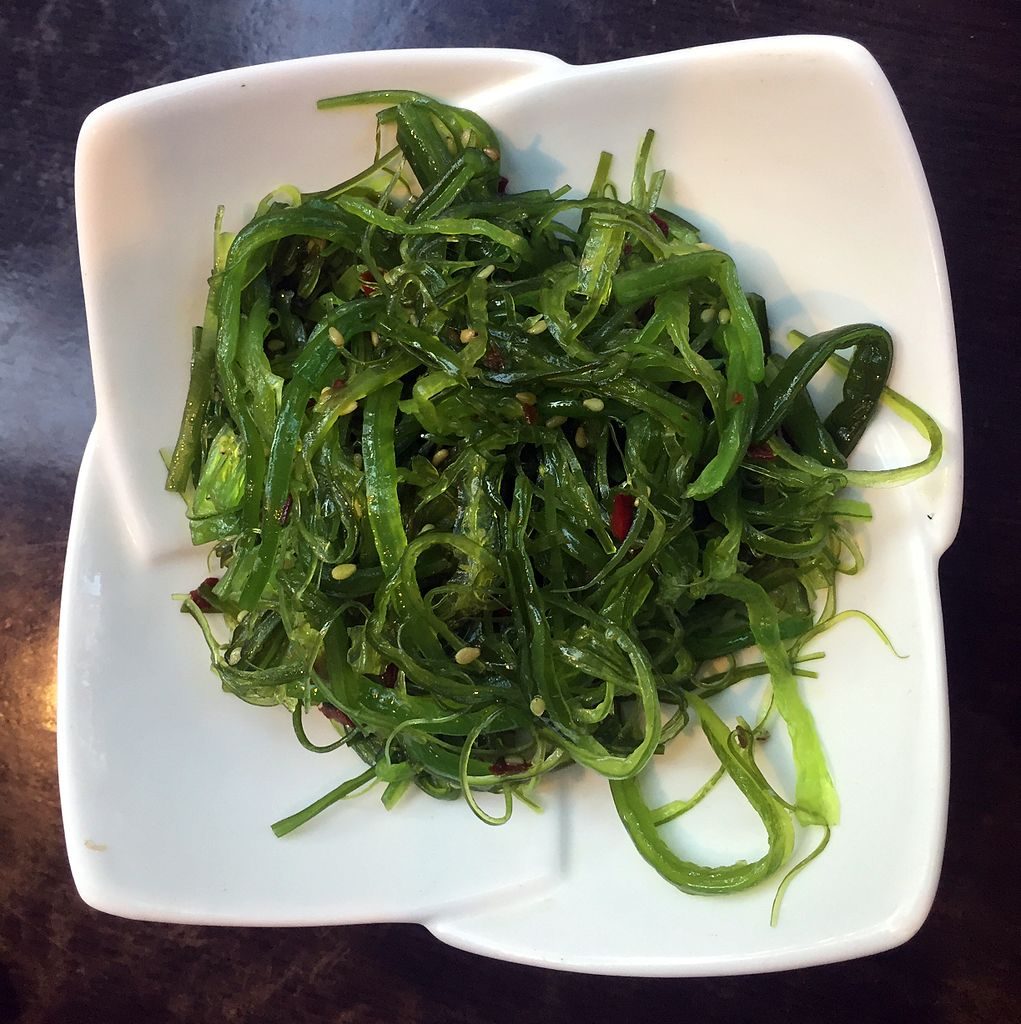Seaweed superfood kelp may support overall health.

Kelp is a kind of edible seaweed. As a greens supplement, it can benefit your health through:
- Providing iodine. Kelp is rich in iodine, which can help individuals with hypothyroidism.
- Antioxidant activity. Kelp contains multiple antioxidants.
- Anti-inflammatory activity. Some constituents of kelp may help reduce inflammation.
- Improved cardiovascular health. Kelp has been shown to reduce elevated blood sugar and cholesterol levels.
- Anti-obesity effects. There is some early evidence that some compounds in kelp can promote fat loss.
Overview
Kelp is a type of brown algae (seaweed) that includes edible species such as kombu (Saccharina japonica), wakame (Undaria pinnatifida), oarweed (Laminaria digitata), and Norwegian kelp (Ascophyllum nodosum). Most types of kelp belong to the biological order Laminariales, and are characterized by the fact that they form dense seaweed “forests” in oceans, serving as habitat for fish and other marine animals.
Similar to other types of algae, kelp has been part of the human diet for thousands of years, especially in coastal nations such as Japan and Great Britain. It is a rich source of minerals, vitamins, and other nutrients and phytochemicals. Kelp’s status as a nutrient-dense vegetable superfood and association with the remarkable longevity of the Japanese people has led to the increasing popularity of kelp supplements.
Kelp and its constituent compounds, such as fucoxanthin and fucoidan, have been reported to have numerous health benefits, including:
- Immunomodulatory and anti-inflammatory activity
- Antioxidant activity
- Antilipidemic (blood fat-lowering)
- Anti-obesity and anti-diabetic effects
Despite these promising early findings, more human research evidence is needed.

How Kelp Might Improve Your Health
Kelp contains many different phytochemical compounds – such as fucoxanthin, fucoidan, fucosterol, and polyphenols – with biological activities, making it difficult to fully describe the mechanisms through which it can benefit your health. However, the most important of these mechanisms appear to be:
Supplying iodine
Kelp is high in iodine – an essential mineral most notable for its role in the production of thyroid hormone. Because of this, individuals suffering from hypothyroidism – low levels of thyroid hormones – often supplement with iodine. Since hypothyroidism can cause weight gain, taking kelp can also help promote weight loss. 1
Increasing UCP1 activity
Mitochondrial uncoupling protein 1 (UCP1) is a type of protein molecule that promotes thermogenesis – the generation of heat. UCP1 is typically only active in brown adipose tissue (BAT), a special type of fat that is present in the human body in small quantities. However, fucoxanthin – a compound present in kelp – has been shown to induce the activity of UCP1 in white adipose tissue (WAT) – the main type of body fat in the human body. By burning fatty acids needed to fuel thermogenesis in white fat cells, fucoxanthin can cause fat loss, suggesting its potential as an anti-obesity agent. 2
Antioxidant activity
Kelp contains a wide range of antioxidant compounds such as fucoxanthin and polyphenols. Antioxidants have the potential to help with a wide range of conditions including Alzheimer’s and rheumatoid (autoimmune) arthritis. 3
Immunomodulatory activity
Immunomodulation refers to the capacity of certain compounds to affect immune system function, and usually results in either the stimulation or suppression (or both) of certain immune system activities. Kelp contains compounds – most notably fucoidan – that have beneficial immunomodulatory properties such as:
- Enhancement of the activity of certain immune cells, such as phagocytes4
- Suppression of pro-inflammatory cytokines via multiple mechanisms such as inhibition of the complement system 5
Kelp Uses & Benefits
People use kelp supplements for three main reasons:
- As a source of iodine to help with hypothyroidism
- Promoting weight loss
- Improving overall health and longevity
While kelp’s efficacy in hypothyroidism is well established, its potential as a fat burner is mostly restricted to early cell culture and animal research. As such, there isn’t enough human evidence to back its use as a fat loss agent. Similarly, while kelp’s general health benefits are backed by a growing volume of animal and human studies that report beneficial activities such as reduced inflammation, improved immune function, and improvement of the lipid profile, as well as alleviation of chronic health conditions such as diabetes and Alzheimer’s, it’s too early to say anything conclusive.

Research
Animal Research
Kelp and its constituent compounds have been demonstrated to have multiple health benefits in test tube and animal studies. Specific findings indicate that:
- Polysaccharides and other compounds in kelp function as antioxidants, and can help regulate levels of blood lipids (fats) such as cholesterol 6 7
- Fucoxanthin, a compound found in kelp, may help burn body fat 8
- Fucoidan, another compound common in kelp, may help with obesity and elevated cholesterol, reduce inflammation, and boost the immune system 9 10 11 12
- Kelp has anti-inflammatory activity, which can help with everything from aging to chronic health disorders such as diabetes and Alzheimer’s 13
- Fucosterol from Undaria pinnatifida may help with osteoporosis 14
Human Research
Human studies of kelp are still few in number, but have corroborated some of the findings of animal research, including anti-obesity effects, antioxidant benefits, and improvement of the blood lipid profile.
This randomized study examined the use of a kelp seaweed supplement in people with diabetes. A total of 20 type 2 diabetics were split into 2 groups: no treatment, and 48 g of powdered kelp pills (made from wakame and kombu) daily for 4 weeks. The kelp group experienced a reduction in blood glucose and triglyceride levels, as well as improvement of HDL (“good”) cholesterol and antioxidant enzyme activity.
- The researchers concluded that “addition of seaweed influences glycemic control and may be effective in lowering blood lipids and improving antioxidant enzyme activities…such effects may reduce risk factors for cardiovascular disease in patients with type 2 diabetes.”15
Ecklonia cava (72 – 144 mg) polyphenols may promote fat loss in overweight individuals
This double-blind, randomized, placebo-controlled study examined the effects of polyphenol compounds extracted from the kelp seaweed Ecklonia cava (ECP) on 97 overweight adults. The participants were divided into 3 groups for 12 weeks: placebo, low-dose ECP (72 mg), and high-dose ECP (144 mg) daily.
Subjects in the ECP groups showed decreases in measures of body fat such as BMI, waist circumference, and body fat ratio, as well as blood lipids such as total cholesterol and LDL (“bad”) cholesterol. In addition, the high dose group experienced reductions in blood sugar and blood pressure, and increases in HDL (“good”) cholesterol.
- With these results, researchers concluded that “ECP supplementation significantly contributed to lowering body fat and serum lipid parameters such as total and LDL cholesterols with dose dependence.“16
Ascophyllum nodosum-enriched bread (4%) may possibly decrease food intake
This pilot study examined the effects of Ascophyllum nodosum – a type of kelp – on energy (caloric) intake in 12 overweight men. The participants were divided into 2 groups: one receiving normal bread, and one receiving bread enriched with 4% kelp, and were measured for how much they ate 4 hours later. The kelp group saw a 16.4% reduction in energy intake on their 4-hour test meal, suggesting potential for aiding with weight loss.
- The researchers concluded that “further investigation of potential mechanisms of action is warranted.”17
Kelp Greens Dosage
- Its difficult to suggest a universal dosage because of the differences in kelp species and preparations used by researchers
- Single-ingredient supplements typically contain 200 to 600 mg of kelp
Available Forms
Raw kelp has been around for years and made its way into various dishes and teas. Here are the three most common forms that you can use today:
- Raw. For those that enjoy seaweed, kelp in its raw form can be added to your meal.
- Powder. Dried, powdered kelp, easy to mix in drinks and foods, and for topical use.
- Capsule. Capsules are an easy way to consume kelp, although iodine dosages vary by brand, so make sure to check the quantity to ensure that you don’t exceed the daily recommendation.
- Tea. If you enjoy the taste of seaweed, kelp can be added to boiling water and used to make tea.
- Kelp is frequently mixed with other green foods such as barley, wheat grass, and spirulina.
Supplements in Review Says
- Kelp as greens.
Kelp may have multiple beneficial effects. There’s evidence that kelp has a wide range of health benefits, including improved immune system function, reduced inflammation, antioxidant activity, and even anti-obesity effects. However, more human studies are needed to back these effects.
Refer to individual supplement doses. Because of the differences in kelp preparations used by researchers it is difficult to suggest a universal dose. As such, it’s best to stick to the dosages recommended by individual kelp supplements.
Leave a Reply